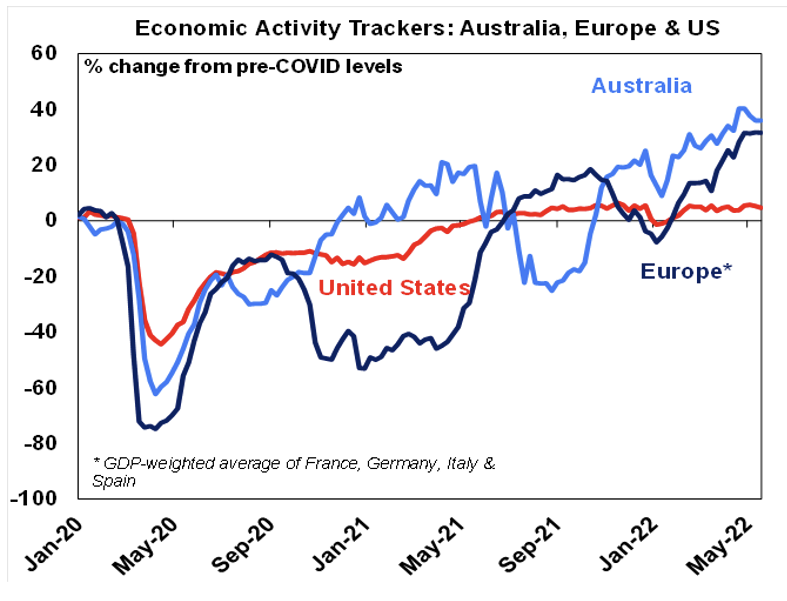

One criticism I occasionally get is that I’m too optimistic and I guess I have to cop it because in the past I’ve criticized others for being too pessimistic. I promise you that if I knew it was more honest to be negative, I would give in to pessimism and I think I will do exactly that in the coming years, but right now I’m giving our economy and stocks the benefit of the doubt.
And given stock markets rise 7-8 years out of 10 and have average returns of 10% per annum over a decade, I’ve always been reluctant to go too easily to the negative.
For the past two days, I’ve been the MC at the Australian Automotive Dealers Association convention in Brisbane and so I read out aspects of yesterday’s story I wrote on this website, which surprised many of the 900 attendees at the auto shindig, given the recent preoccupation of the media with inflation, surging interest rates and recession!
I get what my media mates have to do — they have to give the negative a big run because we as humans actually take negative stories more seriously. And that’s despite the fact that our brains love positivity if it has access to it and if it gets it, that little sucker in our skulls wants more! Well, so scientists say.
I’ve heard this explained medically in a more sophisticated way by health professionals but one of the speakers at the conference, Steven Bradbury, who won our first Winter Olympic gold medal with his famous “last man standing” speed skate final, told the audience how important it is to feed this part of our physiology if you want to win in life.
Certainly, I know sports psychologists aren’t big fans of negative reinforcement, and neither are globally successful coaches of great sporting heroes and teams. These successful leaders aren’t renowned for motivating victory by telling their charges that they stink and they can’t win!
At the conference, I shared with the attendees the list of positives I showed in yesterday’s story. I will repeat them for those who need to be convinced that not all economic news is actually bad right now. Here they are:
And yesterday we learnt that the trade surplus rose by $757 million to $10.5 billion in April and CommSec’s Craig James says, “Australia has posted 52 successive monthly trade surpluses. In the year to April the trade surplus was a record $129 billion.”
This is the same country that went nearly 30 years without a technical recession and no modern economy has ever done that!
Let’s look at the bad news, which I will now list:
Note, I’ve purposely put the word “could” into bold type to show that the bad news is all a future-possible “could” threat, while the actual here and now info about the economy is positive — very positive.
I’m not ruling out the worst-case scenarios of the Ukraine war going on too long but I’m not ruling out a surprise peace deal. Who knows what will happen to China and its pandemic problems, but the news I got from this conference, is that the supply of cars is actually improving and so the car dealers’ issue is that demand for cars is still outstripping this better supply.
That’s another positive sign, and I haven’t even mentioned the record savings in household’s bank accounts, which has to be another plus for the economy’s future.
The great economist, John K. Galbraith told me, when I was asking him what would happen to the world economy when the 1987 stock market crash shocked us all: “There were those economists who say they don’t know and then there are those poor fellows who don’t know they don’t know.”
I don’t know what will happen but the evidence of what happens when an economy comes out of lockdown also seems relevant for when the Ukraine war ends. AMP’s Shane Oliver and his economic activity tracker chart show how economies rebound after a lockdown and so I expect China will grow fast and demand stuff/exports from us soon as it comes out of lockdown.
And the eventual end of the war, will not only push the inflation rate down via lower oil prices and even food prices but it will demand a lot of money be spent to rebuild Ukraine.

The upticks in those lines show when lockdowns end and positivity about spending takes over and it’s a beautiful thing to observe.
We just have to hope that central banks don’t go crazy mad with interest rate rises, and I reckon Dr Phil Lowe at the RBA and Jerome Powell will be doing their best to avoid silly rate rise policies that create recessions.
They could screw it up or they could get it right, and I’m an economist who admits I don’t know categorically, but I know I’m a good chance to be right. And based on my beliefs I’ve invested accordingly with a long-term perspective.
I don’t care if I’m wrong in the short-term as I primarily invest in my super fund and that’s for the long-term.
I think it’s rational positivity and after hanging out with successful family business owners of famous car dealerships for a couple of days, you can’t help being positively inspired about what many of these people have built.
And on the subject of positivity, I recently interviewed Michael Pascalis, who has a tailor business in the Sydney CBD building where our business operates, and Pascalis Bespoke Tailoring was smashed when pandemic lockdowns took away his potential and existing customers.
He told me that desperate times resulted in him pivoting to becoming a disciple of the online world and he discovered that Instagram and other new-age business building strategies really worked for his business.
Negativity did not breed negativity, it pushed him to think outside the square and get outside his comfort zone and now he says he has a better business than he had before the Coronavirus came to town!
Anyone who doubts the power of positivity will live to regret it. Have a look at my interview with Michael below:
Also, check out my best ever interview with the redoubtable and reportable Rudi Filapek-Vandyk on my TV show last night. This was a great stocks interview and many thanks to Rudi.